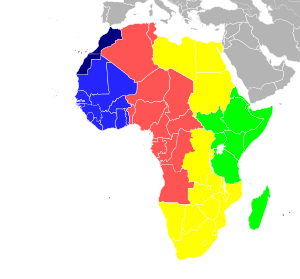Daylight saving time in Morocco

Light colours indicate where standard time is observed all year; dark colours indicate where daylight saving is observed.
Note: The islands of Cape Verde are to the west of the African mainland.
As of 2013, daylight saving time (DST) is observed in Morocco, advancing to UTC+1 at 02:00 on the last Sunday of March, and reverting to UTC (standard time), defined as Greenwich Mean Time locally, at 03:00 on the last Sunday of October, with the exception of the month of Ramadan during which clocks revert to UTC (standard time).[1][2]
For 2014, these dates were:
History
- 2008: DST began on 1 June and ended on 1 September. This was the first time Morocco had used daylight saving time since 1978.[4]
- 2009: DST began on 1 June and ended on 21 August.[5]
- 2010: DST began on 2 May and ended on 8 August, just before Ramadan, as had been the case in recent years.[6]
- 2011: DST began on 2 April at midnight and ended on 31 July at midnight.[7]
- 2012: On Thursday, 8 March 2012, the Moroccan Cabinet approved a bill for the permanent adoption of DST with predictable start and finish dates. However, before the start of DST, they changed it to advance to UTC+1 at 02:00 on the last Sunday of April, and return to UTC at 03:00 on the last Sunday of September, with the exception of the holy month of Ramadan, during which DST will not be observed.[8][9] As a result, the time changes in 2012 were:
- 29 April – advance to UTC+1 (DST)[10]
- 20 July – return to UTC (start of Ramadan)
- 20 August – advance to UTC+1 (end of Ramadan)
- 30 September – return to UTC (standard time)
- 2013: DST followed the 2012 law at first:
- 28 April – advance to UTC+1 (DST)
- 7 July – return to UTC (start of Ramadan)
- 10 August – advance to UTC+1 (end of Ramadan)
However, on Saturday, 28 September, the government announced a change in policy, which moved the end of DST from the last Sunday in September (which was to be the next day) to the last Sunday in October (27 October). At the same time, they moved the beginning of DST back to the last Sunday in March (next 30 March 2014). As usual, advancements to DST (UTC+1) occurred at 02:00 and returns to standard time (UTC) occurred at 03:00.[1][2]
References
- 1 2 "Morocco extends DST to October 27, 2013". timeanddate.com. 28 September 2013. Retrieved 1 October 2013.
- 1 2 "L'horaire d'été (GMT+1) maintenu jusqu'au 27 octobre 2013" (in French). Royaume de Maroc. 28 September 2013. Retrieved October 1, 2013.
- 1 2 "Retour à l'heure légale du Royaume (GMT)" (in French). Moroccan Ministry of the Modernisation of the Public Sector. Retrieved 2014-10-26.
- ↑ "Morocco revives daylight saving schedule in 2008". Timeanddate.com. Retrieved 2010-06-25.
- ↑ "Morocco's Daylight Saving Time Starts June 1, 2009". Timeanddate.com. 17 March 2009. Retrieved 2010-06-25.
- ↑ "Morocco Starts Daylight Saving Time May 2, 2010". Timeanddate.com. 13 April 2010. Retrieved 2010-06-25.
- ↑ "L'heure légale au Maroc sera avancée de 60 mn à partir de dimanche prochain". Map.ma. Retrieved 2011-03-31.
- ↑ "Retour à l'heure légale du Royaume (GMT)" (in French). The Kingdom of Morocco, Ministry of Public Functions and Administration Modernisation. p. 1. Retrieved 2012-07-17.
- ↑ http://www.maroc.ma/PortailInst/Fr/evenements/Le+Conseil+de+gouvernement.htm
- ↑ "Changement de l'heure légale du Royaume" (in French). The Kingdom of Morocco, Ministry of Public Functions and Administration Modernisation. 2012-04-19. Retrieved 2012-07-17.